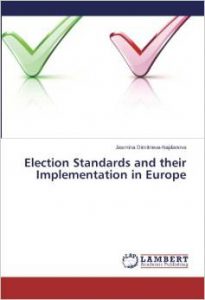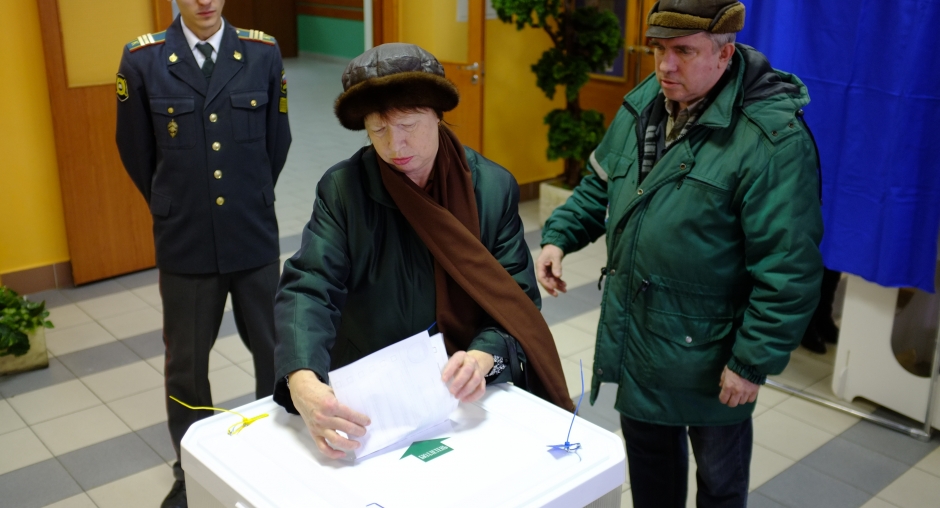By Jasmina Dimitrieva
Are elections and democracy one and the same thing? Not only voters, but also elected officials sometimes confuse democracy with elections. Such mental attitude sees the internationally guaranteed right to public participation in decision-making reduced to elections. The inherent risk is that public participation in the formulation and implementation of public polices for common good, as enunciated in the constitutions of Europe, remains a philosophical concept, with the elections as a sole manifestation of democracy on the physical plan. While looking at the other side of the coin, it seems beyond imagination nowadays to have in place a democratic system of governance without first holding elections, and without a meaningful parliamentary opposition.
The existing European consensus on election rights’ observance affirms representative democracy as foundation for the democratic system of governance. However, not all elections unlock “Ali Baba’s cave” of hidden treasure, i.e., a free expression of the voters’ will. On the contrary, they may resemble more to the forty thieves from the same story, ripping up a country from all its democratic achievements, such as the rule of law, non-discrimination and free media. Consequently, elections cannot be considered sufficient for a society to be considered democratic, as they could lead to a sustainable survival of competitive authoritarianisms.[1]
Europe, understood in its cultural and traditional borders, has already lived through examples of elections, resulting in totalitarian regimes in the 20th century. Internal democratic tradition, political culture and observance of the rule of law still serve as guarantees that history will not repeat itself. Nonetheless, it should not be a taboo for voters and elected elites to dwell on the question of sustainability of democracy. Should we reasonably expect that the democratic system of governance will perpetuate itself indefinitely, or that it will be sustained by an invisible hand in absence of certain pre-conditions for its very existence, such as respect for political rights? To ask this question is even more important now, considering the recent terrorist attacks, which put the enjoyment of freedom in Europe under threat.
In addition, free and fair elections, the minimalist definition of democracy, still represent a challenge for a number of countries in Europe, judging according to the reports of the European electoral watchdogs.[2] The above statement mostly captures the non-EU countries, for example Albania (2013), Macedonia (2013) and Ukraine (2012) which, among other problems, struggle with blurred separation between party and state resources, as well as with impunity, and thus do not fully comply with the European election standards. Furthermore, specific examples of flawed elections include the 2013 Azerbaijani elections, with systematically undermined opposition and intimidated voters, and the 2008 Georgian elections with problematic voters’ lists and restrictive electoral campaign. Furthermore, ethnicity-based restriction to stand in elections noted during 2010 Bosnian elections falls within the ambit of flawed elections. By the same token, the EU countries like Slovenia, France or UK have problems of their own, such as low voter turnout or prisoner disfranchisement. OSCE/ODIHR, among other issues, reported a restrictive media environment during the 2014 Hungarian elections.
If one looks at the patterns of electoral violations, media biased reporting, flawed laws and inadequate remedies are amongst the most frequent violations in the OSCE area, where European countries belong. No country seems immune to problems in the electoral realm, although the EU countries have fewer worries with electoral democracy in comparison to the non-EU countries.
So, should the public be worried about democracy getting reversed in case of flawed elections? European electoral heritage commits the states to hold free, secret, direct, equal and periodic elections for the bodies with law-making power. Therefore, not only political elites, but also voters should be familiar with and actively seeking full respect of the European electoral heritage, as a gatekeeper of democracy. Voters or “soon-to-become” voters should not be percieved only as passive observers of local and European political processes. Public media and dicussion forums are there to be used nor only by the VIPs, but also by the voters in order to connect and express their political, economic and social beliefs.
There is a plethora of best practices of electoral democracy that seek deepening of democratic commitment, and the best thing is that they are all available from the democratic treasures of other European countries. Promotion of persons with disabilities as electoral candidates, funds and resources for proper functioning of the opposition, continuous voters’ education programmes, they all represent the richness of the democratic traditions in Europe.
To end from where we started, if elections equal democracy, then flawed elections equal flawed democracy. Although democracy and elections are not one and the same thing, free and fair elections are a pre-condition for the survival of contemporary democracies. No democratic governance can be born out of corrupt elections. At the end of the day, the role of elections, as one of the building blocks of democracy, is to empower citizens, not to weaken them.
[1] Levitsky & Way, Autocracy by Democratic Rules: The Dynamics of Competitive Authoritarianism in the Post Cold War Era (rev. 2003) p. 7.
[2] See for example electoral assessments of the Organization for Security and Cooperation in Europe (OSCE) at http://www.osce.org/odihr/elections.
More information about European elections can be found in the book “Election standards and their implementation in Europe” from the same author, available at amazon.com or at www.morebooks.de/store/gb/start.
Jasmina Dimitrieva is a graduated lawyer with a doctoral degree in international public law, with a focus on international and European election standards; and extended professional experience in the electoral field, working primarily in the legal and penal aspects of elections.



